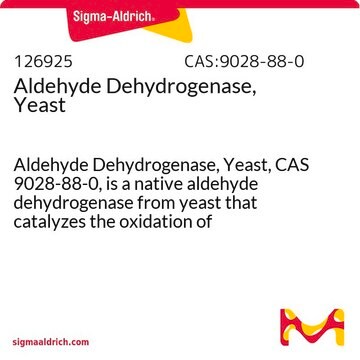A6338
Aldehyde Dehydrogenase, potassium-activated from baker′s yeast (S. cerevisiae)
lyophilized powder, ≥2.0 units/mg protein
Sinónimos:
Aldehyde:NAD[P]+ oxidoreductase
Iniciar sesiónpara Ver la Fijación de precios por contrato y de la organización
About This Item
Productos recomendados
form
lyophilized powder
Quality Level
specific activity
≥2.0 units/mg protein
mol wt
228 kDa
composition
Protein, ≥5.0% biuret
shipped in
dry ice
storage temp.
−20°C
General description
Aldehyde dehydrogenase is a tetramer and has several different isoforms. The enzyme tested in 0.01 M pyrophosphate buffer shows a sharp optimum around pH 9.3 with acetaldehyde as substrate. Potassium ions and cysteine are essential for the enzyme′s activity. Rubidium or NH4+ can be substituted for K+, and glutathione for cysteine. Lithium, Na+, and Cs+ inhibit the reaction. Aldehyde dehydrogenase is inhibited by propylurea, crotonaldehyde, n-propyl isocyanate, cyclohexyl isocyanate, 1-n-propyl-1-[(4-chlorophenyl)sulphonyl]-3-n-propylurea, and 1-methyl-1-[(4-chlorophenyl)sulphonyl]-3-n-propylurea. The enzyme may be utilized to quantitate aldehydes present in blood.
Aldehyde dehydrogenase (ALDH) is present in the nucleus, cytosol, mitochondria and endoplasmic reticulum of cells.
Application
Aldehyde dehydrogenase (ALDH) has been used to evaluate the effects of pear extracts on ALDH activity. It has also been used to colorimetrically determine ethanol by monitoring the enzymatic reduction of nicotinamide adenine dinucleotide (NAD).
Biochem/physiol Actions
Aldehyde dehydrogenase from baker′s yeast catalyzes the reduction of pyridine nucleotides by several aldehydes. It catalyzes the oxidation of a wide range of substrates, such as acetaldehyde, formaldehyde, propionaldehyde, n-butylaldehyde, isobutylaldehyde, n-valeraldehyde, caproaldehyde, benzaldehyde, glycoaldehyde, D-glyceraldehyde, malonic semialdehyde, and succinic aldehyde. Aldehyde dehydrogenase is used to study the production of ethanol and isobutanol. Ethanol concentration can be determined colorimentrically by monitoring the enzymatic reduction of nicotinamide adenine dinucleotide (NAD) using alcohol dehydrogenase after preremoval of aldehyde by aldehyde dehydrogenase.
Unit Definition
One unit will oxidize 1.0 μmole of acetaldehyde to acetic acid per min at 25 °C at pH 8.0 in the presence of β-NAD+, potassium and thiols.
Physical form
Contains lactose, potassium phosphate and citrate buffer salts, and mercaptosuccinic acid.
Reconstitution
This enzyme can be dissolved at 0.3 mg/mL in 100 mM Tris-HCl buffer (pH 8.0), containing 0.02% BSA.
Storage Class
11 - Combustible Solids
wgk_germany
WGK 3
flash_point_f
Not applicable
flash_point_c
Not applicable
ppe
Eyeshields, Gloves, type N95 (US)
Certificados de análisis (COA)
Busque Certificados de análisis (COA) introduciendo el número de lote del producto. Los números de lote se encuentran en la etiqueta del producto después de las palabras «Lot» o «Batch»
¿Ya tiene este producto?
Encuentre la documentación para los productos que ha comprado recientemente en la Biblioteca de documentos.
Los clientes también vieron
Sergey Stolyar et al.
Molecular systems biology, 3, 92-92 (2007-03-14)
The rate of production of methane in many environments depends upon mutualistic interactions between sulfate-reducing bacteria and methanogens. To enhance our understanding of these relationships, we took advantage of the fully sequenced genomes of Desulfovibrio vulgaris and Methanococcus maripaludis to
Monoamine oxidase A activity in fibroblasts as a functional confirmation of MAOA variants.
Tessa M A Peters et al.
JIMD reports, 58(1), 114-121 (2021-03-18)
A two-stage, two-organism process for biohydrogen from glucose
Redwood MD and Macaskie LE
International Journal of Hydrogen Energy, 31(11), 1514-1521 (2006)
Enzymic determination of acetaldehyde in blood.
F LUNDQUIST
The Biochemical journal, 68(1), 172-177 (1958-01-01)
Mark D Redwood et al.
FEMS microbiology letters, 278(1), 48-55 (2007-11-13)
Escherichia coli can perform at least two modes of anaerobic hydrogen metabolism and expresses at least two types of hydrogenase activity. Respiratory hydrogen oxidation is catalysed by two 'uptake' hydrogenase isoenzymes, hydrogenase -1 and -2 (Hyd-1 and -2), and fermentative
Nuestro equipo de científicos tiene experiencia en todas las áreas de investigación: Ciencias de la vida, Ciencia de los materiales, Síntesis química, Cromatografía, Analítica y muchas otras.
Póngase en contacto con el Servicio técnico








